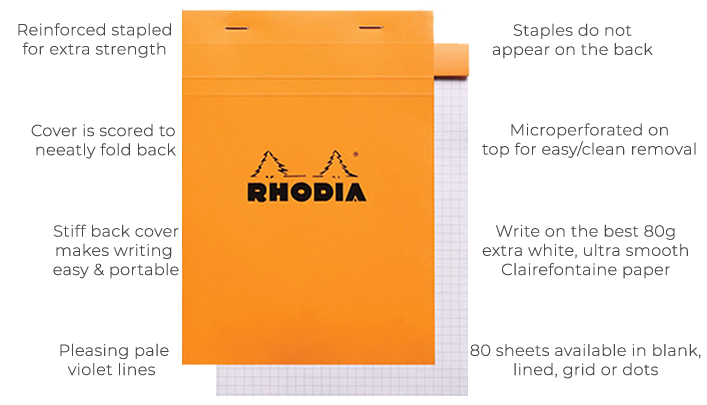 Rhodia's famous French orange notebooks have a cult following for many reasons! These economical pads are a favorite of artists & designers. People love Rhodia pads for their grids, smooth paper and unique scored cover which folds back neatly. The stiff back cover makes writing easy and portable. All Rhodia paper is acid-free and ink-friendly. Their bright orange covers make them instantly recognizable in the store or on the street. Rhodia has been around since the 1930s.
Rhodia's famous French orange notebooks have a cult following for many reasons! These economical pads are a favorite of artists & designers. People love Rhodia pads for their grids, smooth paper and unique scored cover which folds back neatly. The stiff back cover makes writing easy and portable. All Rhodia paper is acid-free and ink-friendly. Their bright orange covers make them instantly recognizable in the store or on the street. Rhodia has been around since the 1930s.
The stationer known as "Papeteries Verilhac Freres" was founded in Lyon, France in 1932 by two brothers, Henri and Robert Verilhac. They came from a family of paper merchants, with two brothers from the previous generation having set up a family business selling paper mainly in the southern part of France and North Africa. In 1934, the company moved from Lyon to Sechilienne near Grenoble in the French Alps. The name "Rhodia" comes from the Rhone, a river flowing by Lyon dividing the Alps from the Massif Central. Production of their notepad began that year. Rhodia was purchased by Clairefontaine in 1997 and production transferred to Mulhouse, in Alsace, France. Members of the Verilhac family still work for Rhodia. The Rhodia logo dates back to 1932. Legend has it that the two Rhodia fir trees symbolize the two founding brothers.
Yet another reason to love Rhodia is that the paper is FSC and PEFC certifed, which ensure the paper and the manufacturing process is sustainable and responsibly managed - helping protect the world's forests. Read more here: Clairefontaine Ecology
Rhodia was purchased in 1997 by the historic Clairefontaine company, located in the Vosges region of France. This was a match made in heaven. A paper-making legend itself, Clairefontaine was established in 1863 on the site of a 16th century paper mill and continues to this day. In fact, it's currently the only manufacturer making its own paper for its own products. This guarantees not only consistent product quality, but also controls the environmental impact of the manufacturing process. Clairefontaine only buys pulp from sustainable forests that are certified according to recognized international standards (PEFC, FSC). The river Meurthe is the source of water supply for the Vosges mill - the water is so clean when it leaves their facility that local people can swim within sight of it.